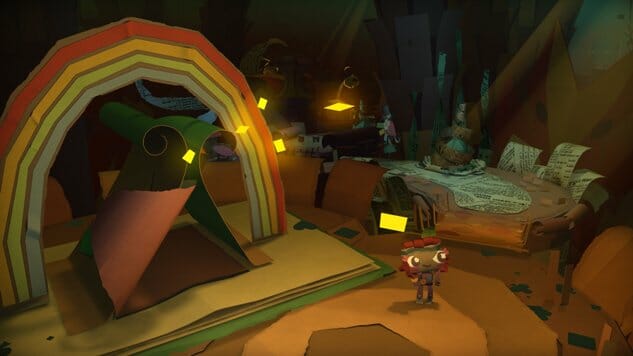Tearaway Unfolded: Paper Please

Tearaway was a nice surprise on the Vita two years ago. In a year where the trend was to depress me as much as possible (notable games from 2013 include BioShock Infinite, The Last of Us and Papers, Please), Tearaway stood out as a romp through paper-crafted landscapes constructed to delight and amuse at every turn. As two new consoles had yet to find their footing or deliver on the promise of providing us something “next-gen,” Tearaway was perfectly comfortable on the year-old handheld it debuted on, using everything the system had to offer and making the potential of the hardware seem obvious. It’s a shame the world hasn’t gone the Vita’s way.
Tearaway Unfolded, a remake of the game for the PS4, feels just as clever this year, and that says as much about the state of games as it does the original Tearaway. Many of the original Vita-specific sections have undergone major overhauls to fit in with the capabilities of Sony’s controller, to the point where I frequently compared my experience to a Let’s Play of the original to make sure I remembered everything correctly (I hadn’t). There’s enough new content here that it’s worth seeing again, even if you’ve already played the original.
And if you haven’t, now’s a good time. Unfolded is an origin myth about the DualShock 4 controller much in the same way the original Tearaway was one about the PlayStation Vita. It is a game about the idea of play, messing around with “meta” conceits about the devices we use to interact with the media we consume. You can put objects “in” the controller after your onscreen avatar throws them directly at the screen, and at one point you’re actually platforming around an in-game DualShock, pressing down buttons to clear them from your path. It wants you to know there’s more to play than what you might think by poking and prodding what these devices can do. It doesn’t always succeed—some of the experiments can be a eye-rollingly “cute” or downright frustrating (I’m convinced tilt controls will never find their place outside of a few driving games)—but at least it’s playing.
It also plays with the concept of an origin myth (in the traditional Native American sense, anyway) by involving the listener (or in this case, the player) in the telling. The omnipresent voices narrating and guiding the game can’t stress hard enough how much this is “your story”: you pick your gender, your eyes, nose, etc. You take photographs of random objects and bring them to life in the world. A companion app lets you take pictures on your phone and use them as the layout of the world. Unfolded will tell the same story every time, but each telling is different in a memorable, distinct way. It’s eager to put front and center many of concepts about play that other games take for granted.
-

-

-

-

-

-

-

-

-

-

-

-

-

-

-

-

-

-

-

-

-

-

-

-

-

-

-

-

-

-

-

-

-

-

-

-

-

-

-

-









































